八年级英语上册Unit2Howoftendoyouexercise-知识点归纳
- 格式:docx
- 大小:17.01 KB
- 文档页数:4

Unit2 How often do you exercise?1. exercise (v/n)的用法1)(动):锻炼. 如:He exercises every day.2) (可数名词):“...操;练习”. 如:do morning/ eye exercises; do math exercises(不可数名词):“锻炼;运动”讲:如:We often do / take exercise on weekends.2. go shopping 意为“去购物”。
Go+ v- ing : 表示进行某项活动。
如:Go swimming/ shopping/skating/skiing/fishing/climbing/hiking3.频率副词:always=all the time一直, usually, often, sometimes=at times , hardly ever, never4.sometimes: 有时候;sometime:某时;some times:许多次/倍; some time: 一段时间5. hard:(1)硬的;困难的;严厉的;勤奋的(形容词)a hard writer(2) 努力地;猛烈地(副词)study/rain hard6.注意:表示“一次或两次”时,一般用once和twice表示。
如:once a month(一个月一次)而表示“三次或以上”时,则用“数词+times”结构。
如:five times a year (一年五次)7.由how构成的疑问词组的用法(1)how many+ 可数名词复数如:how many programs(2)how much+不可数名词如:how much coffee但how much=what’s the price of..? 还有“多少钱”的意思如:How much are those pants?(3)how many times: “多少次”. 其答语表示次数。
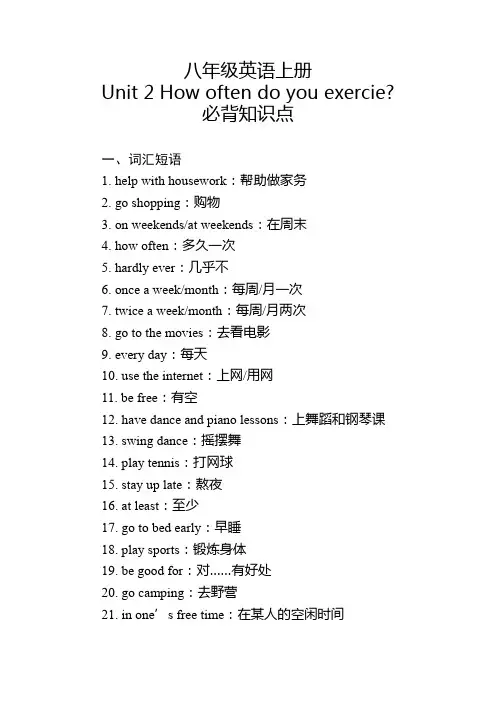
八年级英语上册Unit 2 How often do you exercie?必背知识点一、词汇短语1. help with housework:帮助做家务2. go shopping:购物3. on weekends/at weekends:在周末4. how often:多久一次5. hardly ever:几乎不6. once a week/month:每周/月一次7. twice a week/month:每周/月两次8. go to the movies:去看电影9. every day:每天10. use the internet:上网/用网11. be free:有空12. have dance and piano lessons:上舞蹈和钢琴课13. swing dance:摇摆舞14. play tennis:打网球15. stay up late:熬夜16. at least:至少17. go to bed early:早睡18. play sports:锻炼身体19. be good for:对……有好处20. go camping:去野营21. in one’s free time:在某人的空闲时间22. not…at all:根本不23. the most popular:最流行24. such as:例如25. go to the dentist:去看牙医26. old habits die hard:旧习惯难改27. less than:少于/不到二、语法结构1. 频率副词:always, usually, often, sometimes, never 等,用于描述动作发生的频率。
2. “次数”的表达方法:一次once,两次twice,三次或三次以上用基数词+times,如three times,five times。
3. how often 引导的特殊疑问句:用于询问动作发生的频率,回答常含有频率词组或短语。
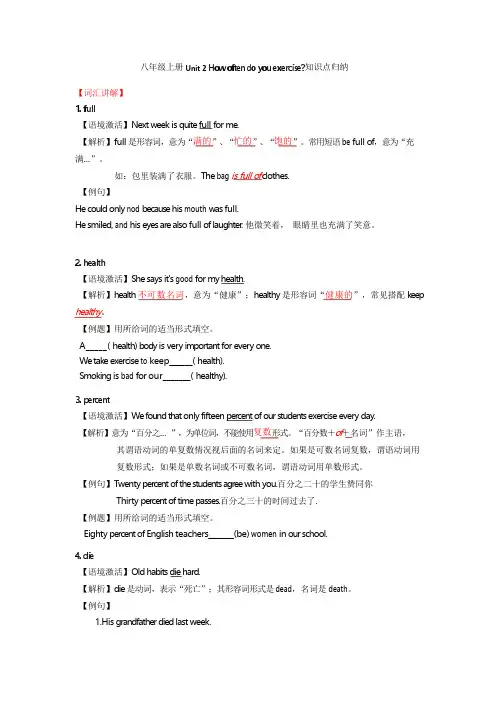
八年级上册Unit2How o ften do you exercise?知识点归纳【词汇讲解】1.full【语境激活】Next week is quite full for me.【解析】full是形容词,意为“满的”、“忙的”、“饱的”。
常用短语be full of,意为“充满...”。
如:包里装满了衣服。
The bag is full of clothes.【例句】He could only nod because his mouth was full.He smiled,and his eyes are also full of laughter.他微笑着,眼睛里也充满了笑意。
2.health【语境激活】She says it's good for my health.【解析】health不可数名词,意为“健康”;healthy是形容词“健康的”,常见搭配k eep healthy。
【例题】用所给词的适当形式填空。
A_____(health)bod y is very important for every one.W e tak e exercise to keep______(health).Smoking is bad for our_______(healthy).3.percent【语境激活】W e found that only fifteen percent of our students exercise every day.【解析】意为“百分之...”,为单位词,不能使用复数形式。
“百分数+of+名词”作主语,其谓语动词的单复数情况视后面的名词来定。
如果是可数名词复数,谓语动词用复数形式;如果是单数名词或不可数名词,谓语动词用单数形式。
【例句】T wenty percent of the students agr ee with you.百分之二十的学生赞同你Thirty percent of time passes.百分之三十的时间过去了.【例题】用所给词的适当形式填空。
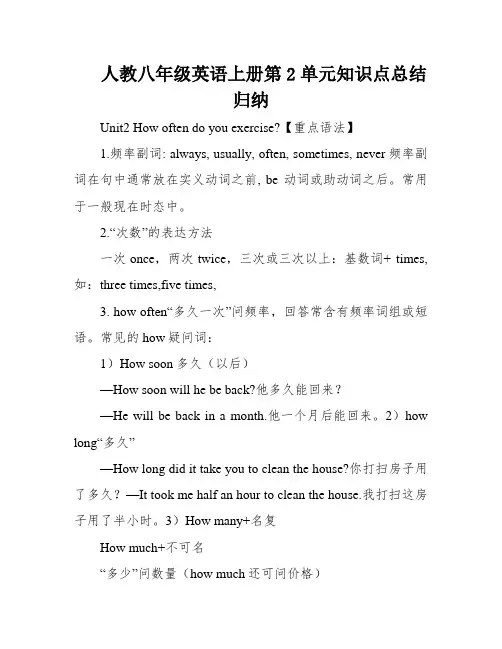
人教八年级英语上册第2单元知识点总结归纳Unit2 How often do you exercise?【重点语法】1.频率副词: always, usually, often, sometimes, never频率副词在句中通常放在实义动词之前, be动词或助动词之后。
常用于一般现在时态中。
2.“次数”的表达方法一次once,两次twice,三次或三次以上:基数词+ times,如:three times,five times,3. how often“多久一次”问频率,回答常含有频率词组或短语。
常见的how疑问词:1)How soon多久(以后)—How soon will he be back?他多久能回来?—He will be back in a month.他一个月后能回来。
2)how long“多久”—How long did it take you to clean the house?你打扫房子用了多久?—It took me half an hour to clean the house.我打扫这房子用了半小时。
3)How many+名复How much+不可名“多少”问数量(how much还可问价格)【重点短语】1. go to the XXX去看电影2. look after = take care of照顾3. surf the internet上网4. XXX健康的生活方式5. go XXX去划板6. keep XXX保持健康7. eating habits饮食气8. XXX exercise做更多的活动9. the same as与甚么不异10. be different from分歧11. once a month一月一次12. XXX一周两次14. most of the students=most students15. shop=go shopping=do some shopping购物18. come home from school放学回家19. of course = certainly = sure当然20. get good grades取得好成绩21. keep/be in good health坚持安康22. take a XXX去度假【词语辨析】1. maybe / may bemaybe是副词,意为“大约,大概,也许”,普通用于句首。
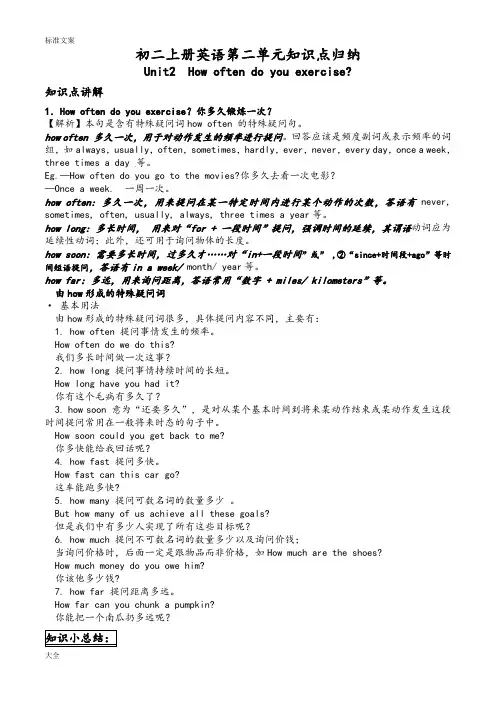
初二上册英语第二单元知识点归纳Unit2 How often do you exercise?知识点讲解1.How often do you exercise?你多久锻炼一次?【解析】本句是含有特殊疑问词how often 的特殊疑问句。
how often 多久一次,用于对动作发生的频率进行提问。
回答应该是频度副词或表示频率的词组,如always,usually,often,sometimes,hardly,ever,never,every day,once a week,three times a day 等。
Eg.—How often do you go to the movies?你多久去看一次电影?—Once a week. 一周一次。
how often: 多久一次,用来提问在某一特定时间内进行某个动作的次数,答语有never, sometimes, often, usually, always, three times a year等。
how long: 多长时间,用来对“for + 一段时间”提问,强调时间的延续,其谓语动词应为延续性动词;此外,还可用于询问物体的长度。
how soon: 需要多长时间,过多久才……对“in+一段时间”或” ,②“since+时间段+ago”等时间短语提问,答语有in a week/ month/ year等。
how far:多远,用来询问距离,答语常用“数字 + miles/ kilometers”等。
由how形成的特殊疑问词·基本用法由how形成的特殊疑问词很多,具体提问内容不同,主要有:1. how often 提问事情发生的频率。
How often do we do this?我们多长时间做一次这事?2. how long 提问事情持续时间的长短。
How long have you had it?你有这个毛病有多久了?3. how soon 意为“还要多久”,是对从某个基本时间到将来某动作结束或某动作发生这段时间提问常用在一般将来时态的句子中。
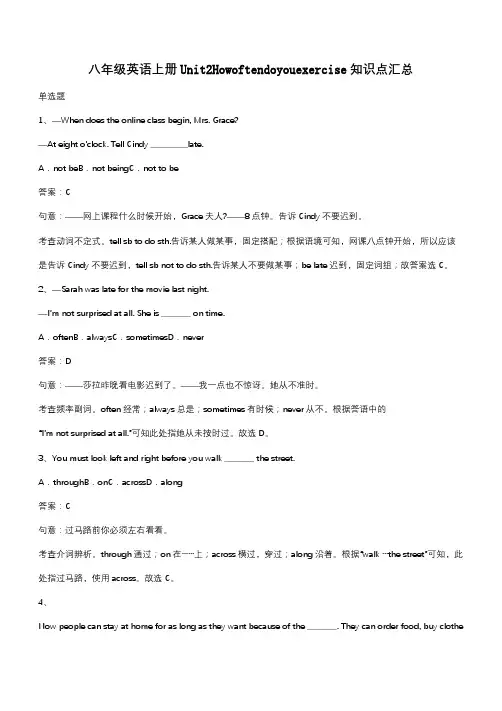
八年级英语上册Unit2Howoftendoyouexercise知识点汇总单选题1、—When does the online class begin, Mrs. Grace?—At eight o'clock. Tell Cindy __________late.A.not beB.not beingC.not to be答案:C句意:——网上课程什么时候开始,Grace夫人?——8点钟。
告诉Cindy不要迟到。
考查动词不定式。
tell sb to do sth.告诉某人做某事,固定搭配;根据语境可知,网课八点钟开始,所以应该是告诉Cindy不要迟到,tell sb not to do sth.告诉某人不要做某事;be late迟到,固定词组;故答案选C。
2、—Sarah was late for the movie last night.—I’m not surprised at all. She is ________ on time.A.oftenB.alwaysC.sometimesD.never答案:D句意:——莎拉昨晚看电影迟到了。
——我一点也不惊讶。
她从不准时。
考查频率副词。
often经常;always总是;sometimes有时候;never从不。
根据答语中的“I’m not surprised at all.”可知此处指她从未按时过。
故选D。
3、You must look left and right before you walk ________ the street. A.throughB.onC.acrossD.along答案:C句意:过马路前你必须左右看看。
考查介词辨析。
through通过;on在……上;across横过,穿过;along沿着。
根据“walk…the street”可知,此处指过马路,使用across。
故选C。
4、Now people can stay at home for as long as they want because of the ________. They can order food, buy clothes, have classes, ect.A.worldB.InternetC.supermarketD.restaurant答案:B句意:现在因为有了互联网,人们想待在家里多久就待多久。
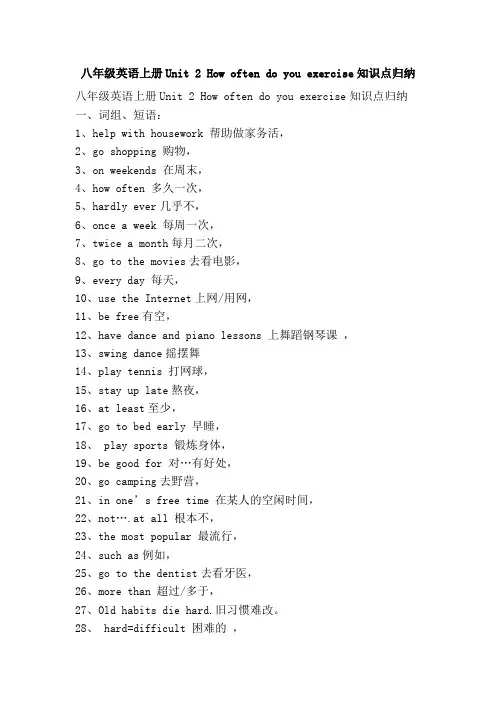
八年级英语上册Unit 2 How often do you exercise知识点归纳八年级英语上册Unit 2 How often do you exercise知识点归纳一、词组、短语:1、help with housework 帮助做家务活,2、go shopping 购物,3、on weekends 在周末,4、how often 多久一次,5、hardly ever几乎不,6、once a week 每周一次,7、twice a month每月二次,8、go to the movies去看电影,9、every day 每天,10、use the Internet上网/用网,11、be free有空,12、have dance and piano lessons 上舞蹈钢琴课,13、swing dance摇摆舞14、play tennis 打网球,15、stay up late熬夜,16、at least至少,17、go to bed early 早睡,18、 play sports 锻炼身体,19、be good for 对…有好处,20、go camping去野营,21、in one’s free time 在某人的空闲时间,22、not….at all 根本不,23、the most popular 最流行,24、such as例如,25、go to the dentist去看牙医,26、more than 超过/多于,27、Old habits die hard.旧习惯难改。
28、 hard=difficult 困难的,29、less than 少于/不到二、重要句子(语法):What do you usually do on weekends你周末通常做什么 I always exercise.总是锻炼身体。
What do they do on weekends他们周末干什么 They often help with housework.他们经常帮助干家务活。
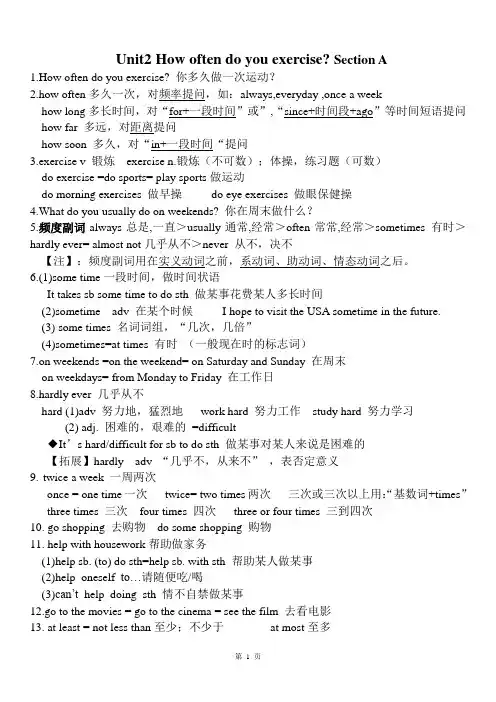
Unit2 How often do you exercise? Section A1.How often do you exercise? 你多久做一次运动?2.how often多久一次,对频率提问,如:always,everyday ,once a weekhow long多长时间,对“for+一段时间”或”,“since+时间段+ago”等时间短语提问how far 多远,对距离提问how soon 多久,对“in+一段时间“提问3.exercise v 锻炼exercise n.锻炼(不可数);体操,练习题(可数)do exercise =do sports= play sports做运动do morning exercises 做早操do eye exercises 做眼保健操4.What do you usually do on weekends? 你在周末做什么?5.频度副词always总是,一直>usually通常,经常>often常常,经常>sometimes 有时>hardly ever= almost not几乎从不>never 从不,决不【注】:频度副词用在实义动词之前,系动词、助动词、情态动词之后。
6.(1)some time一段时间,做时间状语It takes sb some time to do sth 做某事花费某人多长时间(2)sometime adv 在某个时候I hope to visit the USA sometime in the future.(3) some times 名词词组,“几次,几倍”(4)sometimes=at times 有时(一般现在时的标志词)7.on weekends =on the weekend= on Saturday and Sunday 在周末on weekdays= from Monday to Friday 在工作日8.hardly ever 几乎从不hard (1)adv 努力地,猛烈地work hard 努力工作study hard 努力学习(2) adj. 困难的,艰难的=difficult◆It’s hard/difficult for sb to do sth 做某事对某人来说是困难的【拓展】hardly adv “几乎不,从来不”,表否定意义9.twice a week 一周两次once = one time一次twice= two times两次三次或三次以上用:“基数词+times”three times 三次four times 四次three or four times 三到四次10.go shopping 去购物do some shopping 购物11.help with housework帮助做家务(1)help sb. (to) do sth=help sb. with sth 帮助某人做某事(2)help oneself to…请随便吃/喝(3)can’t help doing sth 情不自禁做某事12.go to the movies = go to the cinema = see the film 去看电影13. at least = not less than至少;不少于at most至多14. use the Internet 上网15.What’s your favorite program?=What program do you like best?你最喜欢的节目是什么?16.every day 每天= each day 做状语,放在句末,对其提问用how ofteneveryday = daily adj. 每天的,作定语,修饰名词,放在名词之前He exercises every day. 他每天都锻炼。
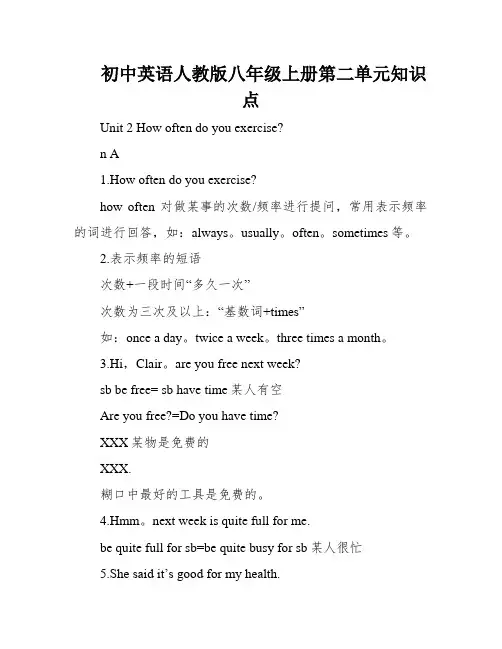
初中英语人教版八年级上册第二单元知识点Unit 2 How often do you exercise?n A1.How often do you exercise?how often对做某事的次数/频率进行提问,常用表示频率的词进行回答,如:always。
usually。
often。
sometimes等。
2.表示频率的短语次数+一段时间“多久一次”次数为三次及以上:“基数词+times”如:once a day。
twice a week。
three times a month。
3.Hi,Clair。
are you free next week?sb be free= sb have time某人有空Are you free?=Do you have time?XXX某物是免费的XXX.糊口中最好的工具是免费的。
4.Hmm。
next week is quite full for me.be quite full for sb=be quite busy for sb某人很忙5.She said it’s good for my health.health (n.)安康---XXX(adj.)安康的XXXBe in good health=healthy身材安康Grammar focus1不安康的6.How often的用法how often用来对透露表现做某事的频次举行发问,回覆时能够用透露表现频次副词或透露表现频次的短语举行回覆。
如:How often do you go shopping?1)---Ioftengo shopping。
(频次副词回覆)2)---I go shopping twice a week。
(频次短语回覆)2.频次副词位置:be之后,动之前。
(be动词之后,Shiite动词之前)频率词及发生概率大小(由大到小):Always。
usually。
often。
sometimes。
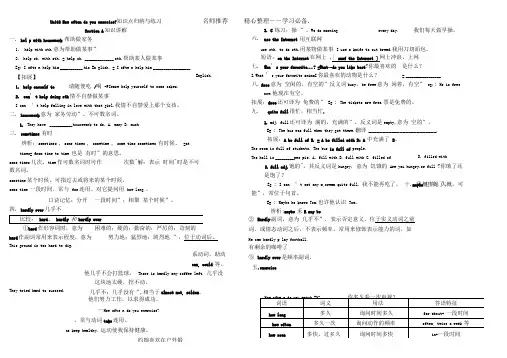
Unit2 How often do you exercise?知识点归纳与练习Section A 知识讲解一. hel p with housework 帮助做家务1. help with sth.意为帮助做某事”2. help sb. with sth. = help sb. ______________ sth.帮助某人做某事Eg: I ofte n help him ___________ his En glish. = I ofte n help him __________________【拓展】1. help oneself to请随便吃 /喝 -PIease help yourself to some cakes.2. can ' t help doing sth 情不自禁做某事I can ‘ t help falling in love with that girl.我情不自禁爱上那个女孩。
二. housework 意为 家务劳动”。
不可数名词。
1. They have ___________ housework to do. A. many B. much三. sometimes 有时辨析:sometimes , some times , sometime , some time sometimes 有时候。
=attimes= from time to time 也是 有时”的意思。
some times 几次。
time 作可数名词时可作次数"解;表示 时间"时是不可数名词。
sometime 某个时候。
可指过去或将来的某个时候。
some time 一段时间。
常与 for 连用。
对它提问用 how long 。
口诀记忆:分开 一段时间”;相聚 某个时候”。
四. hardly ever 几乎不①hard 作形容词时,意为困难的;硬的;勤奋的;严厉的;苛刻的hard 作副词常用来表示程度,意为 努力地;猛烈地;剧烈地 ”,位于动词后。
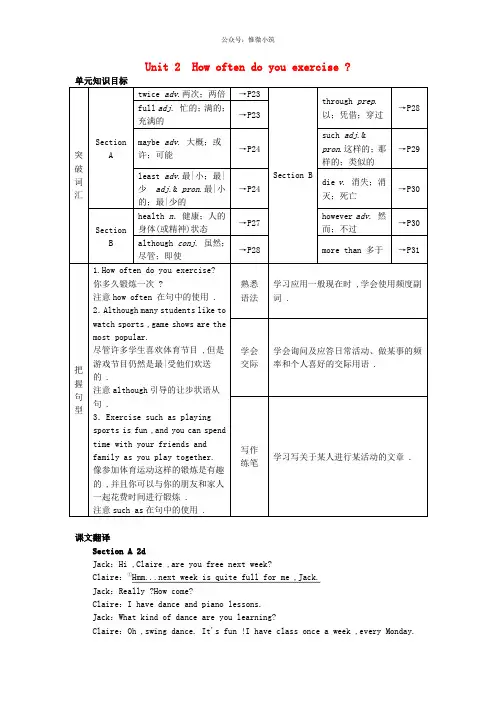
Unit 2 How often do you exercise ?课文翻译Section A 2dJack:Hi ,Claire ,are you free next week?Claire:①Hmm...next week is quite full for me ,Jack.Jack:Really ?How come?Claire:I have dance and piano lessons.Jack:What kind of dance are you learning?Claire:Oh ,swing dance. It's fun !I have class once a week ,every Monday.Jack:How often do you have piano lessons?Claire:Twice a week ,on Wednesday and Friday.Jack:Well ,how about Tuesday?Claire:Oh ,I have to play tennis with my friends.But do you want to come?Jack:Sure !,杰克:你好 ,克莱尔 ,下周你有空吗 ?克莱尔:呣……下周我很忙 ,杰克 .杰克:真的吗 ?怎么会那样 ?克莱尔:我上舞蹈课和钢琴课 .杰克:你学习的是什么舞蹈 ?克莱尔:噢 ,摇摆舞 .很有趣 !我一周上一次课 ,每周一上课 .杰克:你多久上一次钢琴课 ?克莱尔:一周两次 ,在周三和周五 .杰克:噢 ,周二怎么样 ?克莱尔:哦 ,我要与朋友打网球 .你想来参加吗 ?杰克:当然了 !知识详解1.How often do you exercise ?你多久锻炼一次 ?【解读】本句是含有特殊疑问词how often 的特殊疑问句 .【解读】how often 多久一次 ,用于对动作发生的频率进行提问 .回容许该是频度副词或表示频率的词组,如always,usually,often,sometimes,hardly,ever,never,every day,once a week ,three times a day等 .-How often do you go to the movies?你多久去看一次电影 ?-Once a week.一周一次 .【例题】 -______ do you practice English?-Every day.A.How long B.How oftenCA 多长时间;多长(指长度) ×B 多久一次√C 多大岁数×D 多久×句意 "你多久练习一次英语 ?〞 "每天 .〞2.What do you usually do on weekends ?周末你通常干什么 ?【解读】本句是主语为第二人称的一般现在时的特殊疑问句 ,询问在现在一段时间内经常或习惯做的事情 .其结构为:What do you+动词原形+其他 ?假设主语为第三人称单数时 ,特殊疑问句结构为:特殊疑问词(组)+does+主语+动词原形+其他 ?What do you often do on Mondays?星期一你通常干什么 ?I often play soccer with my friends.我通常和朋友一起踢足球 .【解读】usually adv.通常 ,表频率 .一般情况下 ,usually多用于一般现在时态中 .I usually do my homework after supper.我通常在晚饭后做作业 .【注意】表频率的副词一般放在行为动词之前 ,be动词、助动词或情态动词之后 . 【拓展】usual adj. 通常的 ,平常的He always does that in the usual way.他总是用惯常的方式做那件事情 .【例1】 -When ______she usually exercise?-In the morning.A.do B.doesC.解析由usually 可知用一般现在时 ,故排除C项;由主语she是第三人称单数可排除A项;由exercise是动词原形可排除D项 .答案B句意 "她通常什么时候锻炼 ?〞 "在早上 .〞【例2】 I ______ shop on Saturdays.A.finally B.almostC.A 最|终×B 几乎×C 通常√D 几乎 ,差不多×句意我通常在星期六去商店购物 .3.twice a week一周两次【解读】twice adv. 两次We have Chinese twice a day on Friday.周五我们一天上两节语文课 .当提问twice时 ,可以用疑问词how many times(多少次) ,但不能用how often 提问 .how often 可提问twice a week.How many times have you watched the program?这节目你看了多少次 ?How often do you watch the program?你多久看一次这个节目 ?【注意】英语中 ,once表示 "一次〞 ,twice表示 "两次〞 ,从 "三次〞起用 "基数词+times〞表示次数 .three times三次 ,five times五次 .【例1】The Smiths go to Australia ______ a year.A.one B.twoC解析one ,two ,three 是基数词 ,后应直接接名词 ,而year前有冠词 ,twice表示 "两次〞 .答案D句意史密斯夫妇一年去澳大利亚两次 .【例2】对画线局部提问I went to Hainan twice last year.________________________________________________________________________点拨:画线局部表示的是次数 ,那么就应该用询问次数的疑问词how many times 来提问 .答案:How many times did you go to Hainan last year?4.①Hmm...next week is quite full for me ,Jack.呣……下周我很忙 ,杰克 .【解读】full adj. 忙的;满的;充满的常用短语为be full of... ,意为 "充满……〞;反义词是empty ,意为 "空的〞 .The bus is full of people.公共汽车里挤满了人 .【拓展】full adj. 吃饱的;过饱的 ,其反义词是hungry ,意为 "饥饿的〞 .Are you hungry or full ?你饿了还是饱了 ?【例题】There is a glass on the table. It's full ______ water.A.with B.inC.of D.at点拨:此题考查full的用法 .be full of意为 "充满……〞 ,故用介词of .句意为 "桌子上有一个玻璃杯 .它装满了水〞 .答案:C5.I go to the movies maybe once a month.我可能一月去看电影一次 .【解读】maybe adv. 大概;或许;可能Maybe that man is a police man.或许那人是警察 .【辨析】maybe 副词 ,意为 "或许;大概〞 ,常位于句首|表推测 .Maybe he is at Jim's home.或许他在吉姆家 .may be 由情态动词may和 be构成 ,意为"可能〞 ,在句中作谓语 .He may be right.他可能是对的 .【例题】______ Li Hua wants to be an astronaut like Yang Liwei. A.May be B.May解析首|先看句子 ,A项可作谓语 ,B项与动词连用构成谓语 ,本句不缺少谓语 ,故排除A、B两项;C项不放在句首| ,而是置于系动词、助动词、情态动词后 ,实义动词前 ,故排除 .答案D句意或许李华想成为像杨利伟那样的宇航员 .6.He plays at least twice a week.他至|少一周踢(足球)两次 .【解读】least adv.最|小;最|少adj.& pron.最|少的;最|小的 ,它是little的最|高级| .He has least money of all of us.在我们所有人中他的钱最|少 .She works least.她工作最|少 .We have least time.我们时间最|少 .at least 至|少;不少于;起码 ,其反义短语为:at most 至|多At least he should say thanks.他至|少应该说声谢谢 .【例题】There are ______ three thousand people in the park.A.at first B.at lastC.at least D.at the least点拨:A项意为 "首|先〞;B项意为 "最|后〞;C项意为 "至|少〞;D项短语有误 .句意为 "在公园里至|少有三千人〞 .答案:C语法频度副词我们平时会这样说:你经常去看电影吗 ? 他有时来我家玩 .我一周给他写一封信 .我从来没有去国外旅行过等等 .诸如 "经常 ,有时 ,一周一次 ,从来没有〞这样的词在英语中叫频度副词 .频度副词表示什么呢 ?频度副词表示行为动作的频率 ,本单元中我们接触的主要是频度副词 ,按其频率发生的上下分别是:always 总是; usually 通常;often 经常; sometimes 有时;hardly ever 几乎不;never 从不 .根本用法:1.频度副词表示经常性的动作或情况 ,常和一般现在时连用 ,表示现在经常或反复发生的动作 .They always go to the park by bus.他们总是乘公共汽车去公园 .2.频度副词一般放在系动词be、助动词、情态动词之后 ,实义动词之前 .Kate is often late for school.凯特经常上学迟到 .3.对这些频度副词进行提问时 ,用特殊疑问词how often ,意为 "多久一次〞 .I sometimes_ watch TV programs.(对画线局部提问)How often do you watch TV programs?你多久看一次电视节目 ?【例1】I hope ______ to see him again.A.ever B.oftenC.always【例2】 -How often do you visit your grandparents?-______..For a week B.Once a weekA【例3】My mother hates cyber bars(网吧).She ______allows(允许)me to go in.A.once B.neverC.A 一次×B 从来不√C 经常×D 总是×句意妈妈讨厌网吧 .她从不允许我进入 .Section B & Self Check课文翻译Section B 2bWhat Do No.5 High School StudentsDo in Their Free Time?Last month we asked our students about their free time activities. Our questions were about exercise ,use of the Internet and watching TV. Here are the results.We found that only fifteen percent of our students exercise every day. Forty five percent exercise four to six times a week. Twenty percent exercise only one to three times a week. And twenty percent do not exercise at all!We all know that many students often go online ,but we were surprised that ninety percent of them use the Internet every day. The other ten percent use it at least three or four times a week. Most students use it for fun and not for homework.The answers to our questions about watching television were also interesting. Only two percent of the students watch TV one to three times a week. Thirteen percent watch TV four to six times a week. And eighty -five percent watch TV every day !①Although many students like to watch sports ,game shows are the most popular.②It is good to relax by using the Internet or watching game shows ,but we think the best way to relax is through exercise. It is healthy for the mind and the body.③Exercise such as playing sports is fun ,and you can spend time with your friends and family as you play together.④And remember , "old habits die hard〞.So start exercising before it's too late !,第五中学的学生们在空闲时间做什么 ?上个月我们咨询了学生们空闲时间的活动 .我们询问的问题有关锻炼、上网和看电视 .下面是咨询的结果 .我们发现仅仅有15%的学生每天参加锻炼 .45%的学生每周锻炼4~6次 .20%的学生每周仅锻炼1~3次 .并且有20%的学生根本不参加锻炼 .我们知道大多数学生经常上网 ,但是令我们惊讶的是90%的学生每天都上网 .另外10%的学生一周至|少上网3至|4次 .大多数学生上网是为了娱乐而不是为了作业 .关于看电视这个问题的答案也很有趣 .仅仅2%的学生一周看1~3次电视 .13%的学生一周看4~6次 .并且85%的学生每天都看电视 .尽管许多学生喜欢观看体育节目 ,但是游戏节目仍然是最|受他们欢送的 .尽管上网或观看游戏节目对放松很有好处 ,但是我们认为锻炼是最|好的放松方式 .锻炼使我们的大脑和身体更加健康 .像参加体育运动这样的锻炼是有趣的 ,并且你可以与你的朋友和家人一起花费时间进行锻炼 .请记住: "旧习惯是很难摈弃的 .〞所以我们要在身体还很健康的时候就开始锻炼 .知识详解1.She says it's good for my health. 她说它对我的健康有益 .【解读】本句是一个含有省略that的宾语从句的复合句 .She says 是主句 ,其后省略了that ,it's good for my health作says的宾语 .【解读】be good for 对……有益Exercise is good for you.锻炼对你有益 .【拓展】be good at 在……方面做得好;擅长……He is good at learning languages.他擅长学习语言 .be good with 与……相处融洽The teacher is good with his students.这位老师和他的学生相处融洽 .be good to 对……友好My new deskmate is good to me.我的新同桌对我很友好 .【解读】health n. 健康 ,是不可数名词 .I think health is more important than money.我认为健康比金钱更重要 .be in good/poor health 身体状况好/不好My grandparents are both in good health.我祖父母身体都很好 .【拓展】healthy adj. 健康的We should eat healthy food.我们应当吃健康的食物 .unhealthy adj.不健康的Junk food is unhealthy.垃圾食品是不健康的 .【例1】Are the sunglasses good ______ eyes?A.D.at【例2】用good的相关短语填空1.He is good______ drawing.2.She is good______ the old woman.3.Milk is good ______children.4.Our teachers are all good ______us.点拨:此题考查good的几个短语的用法 .题1 , "他擅长画画〞 ,用be good at;题2 , "她对老太太很好〞 ,用be good to;题3 , "牛奶对儿童有益〞 ,用be good for;题4 , "我们的老师都与我们相处得很好〞 ,用be good with .答案:【例3】Cola is ______ ,and it's not good for your ______. A.healthy;health B.unhealthy;healthy解析根据后半句中your后应接名词 ,排除B项;is是系动词 ,后接形容词 ,排除D项;因为cola 属于垃圾食品 ,应该是 "不健康的〞 ,排除A项 .答案C句意可乐是不健康的 ,并且它对你的健康没有好处 .2.How many hours do you sleep every night ?你每天晚上睡几个小时 ?【解读】本句是一个特殊疑问句 .【解读】how many 多少 ,后接名词复数 .How many students are there in your school?你们学校有多少名学生 ?【辨析】how many 和how muchhow many和how much都可以表示 "多少〞 ,但how many后接可数名词复数 ,而how much后接不可数名词 .How many girls can you see?你能看见多少个女孩 ?How much milk do you want?你想要多少牛奶 ?【例题】 -______hours do they exercise every day?-Two.A.How much B.How manyA 多少 ,后接不可数名词×B 多少 ,后接可数名词复数√C 多久一次 ,表动作的频率×D 多久 ,多长×句意 "他们每天锻炼多少小时 ?〞 "两个小时 .〞3.①Although many students like to watch sports,game shows are the most popular.尽管许多学生喜欢观看体育节目 ,但是游戏节目仍然是最|受他们欢送的 .【解读】本句是复合句 ,although many students like to watch sports是让步状语从句 .【解读】although conj. 虽然;尽管;即使相当于though ,引导让步状语从句 .在英语中 ,although(though)和but不能连用在同一个句中 ,即二者只能取其一 .Although he is tired ,he didn't stop to have a rest.=He is tired ,but he didn't stop to have a rest.尽管他累了 ,但他没有停下来去休息 .【例题】______ she is young ,______ she knows a lot.A.Although;but B.Though;butC解析因为although(though)不能和but同时用在一个句子中 ,故排除A、B两项;D项although/though和 but答案C都不用 ,缺乏以表达句意 ,故排除 .句意尽管她年纪小 ,她却懂得很多 .4.②It's good to relax by using the Internet or watching game shows,but we think the best way to relax is through exercise.尽管通过上网或观看游戏节目对放松很有好处 ,但是我们认为锻炼是最|好的放松方式 .【解读】本句是由but连接的并列复合句 .前一个分句中 ,it是形式主语 ,真正主语是动词不定式 to relax by using the Internet or watching game shows;后一个分句中 ,we think后接的是一个宾语从句 ,省略了that .【解读】through prep. 以;凭借;穿过He became rich through hard work and ability.他凭借辛苦的工作和能力变得富有 .The sunlight was coming in through the window.阳光穿过窗户照进来 .【辨析】through ,across ,overthrough意为 "穿过〞 ,指从物体的里面穿过 .across意为 "穿过〞 ,指从物体的外表通过 .over意为 "越过;跨过〞 ,指越过一个有高度的物体 .They walked through the park after supper.晚饭后他们穿过了公园 .I swam across the river and felt very tired.我游过了河 ,感到很累 .Can you jump over the fence?你能跳过篱笆吗 ?【例1】 Did he get the job ______ his father or his uncle?A.by B.on C.through D.under点拨:浏览题干和选项可知句意为 "他是通过他的爸爸还是他的舅舅得到的那份工作 ?〞 ,表示 "凭借;通过〞 ,选C项 .答案:C【例2】 He climbed ______ the window and went into the classroom.A.across B.throughC.over D.on点拨: "从窗户里通过〞即从里面通过 ,故用through .答案:B【例3】 Go ______ the street and you can find the shop.A.across B.throughC.over D.cross点拨: "从街道穿过〞即从街道的外表通过 ,应选across .而cross是动词 .答案:A5.③Exercise such as playing sports is fun ,and you can spend time with your friends and family as you play together.像参加体育运动这样的锻炼是有趣的 ,并且你可以与你的朋友和家人一起花费时间进行锻炼 .【解读】such adj.& pron.这样的;那样的;类似的作形容词时 ,其后修饰名词 .Tom lives in such a large house.汤姆住在一所这么大的房子里 .【辨析】such和so二者都有 "如此;这样〞的意思 ,但具体用法相异 .such用来修饰名词 ,so用来修饰形容词或副词 .①such+a/an+adj.+n.(单数)②such+adj.+n.(复数/不可数名词)③so+adj./adv.④so+adj.+a/an+n.(单数)=such+a/an+adj.+n.(单数)⑤so+many/few/much/little+n.(复数/不可数名词)He is such a clever boy.=He is so clever a boy.他是如此聪明的一个男孩 .It's such fine weather today.今天天气如此好 .They didn't have so much time to do their homework.他们没有如此多的时间去做作业 .such as 例如;像……这样表示举例 ,相当于like .I like animals such as cats and dogs.我喜欢动物 ,像猫和狗 .such as结构既可表示为 "名词+such as+例子〞 ,也可表示为 "such+名词+as+例子〞 .I enjoy songs such as this one.=I enjoy such songs as this one.我喜欢像这首|歌一样的歌 .【例1】 He is ______ funny boy and we all like him.A.such B.soC.such a D.so a点拨:funny修饰boy ,说明空处修饰名词boy ,故排除B、D两项;boy是可数名词 ,故排除A项 .句意为: "他是那么有趣的一个男孩 ,我们都喜欢他 .〞答案:C【例2】 Can you believe that in ______ a rich country there should be ______ many poor people?A.such;such B.so;soC.such;so D.so;such点拨:a rich country 意为 "一个富有的国|家〞 ,用such修饰;many要用so修饰 .句意为 "你能相信在这么富有的一个国|家里竟然有如此多的穷人吗 ?〞答案:C【例3】 He knows five languages ______ English and Japanese.A.are like B.such asC.such like D.as such点拨:A项意为 "像〞;C项错误;D项错误;句意为 "他懂五种语言 ,像英语和日语〞 .答案:B【例4】根据汉语意思完成下句他早餐吃了一些水果 ,像香蕉和橙子 .He ate some fruit ______ ______ bananas and oranges for breakfast.答案:such as6.④And remember , "old habits die hard〞.请记住: "旧习惯是很难摈弃的〞 .【解读】die v. 消失;消灭;死亡(1)作 "死亡〞讲 ,是不及物动词 ,不能用于被动语态 ,强调动作 ,是瞬间动词 ,不能与表示一段时间的状语连用 .His grandfather died five years ago.他祖父五年前去世的 .(2)die可以用于进行时态 ,表示 "即将死去 ,奄奄一息〞 .He is dying.他快要死了 .【拓展】dead 死的 ,是die的形容词形式 .可作表语或定语 .作表语时 ,表示状态 .His dog has been dead for two weeks.他的狗已死了两周了 .death 死亡 ,是die的名词形式 .His mother's death made him very sad.他母亲的去世使他非常难过 .【例1】 -Did the bird ______ ?-No ,but it ______.A.die;dying B.dead;deathC.die;is dying D.death;is dying点拨:浏览题干可知助动词Did开头 ,其后接动词原形 ,故排除B、D两项;根据句意 " - -这只鸟死了吗 ? - -没有 ,但是它快要死了 .〞可知 ,用现在进行时 .答案:C【例2】 The ______ dog ______ because of illness.A.dead;death B.died;deadC.died;death D.dead;died点拨:dog是名词 ,其前应用形容词修饰 ,所以排除B、C两项;第二空内的词在句中作谓语 ,应选一个动词 ,排除A项 ,因为death是名词 .句意为 "这条死了的狗是由于疾病而死的〞 .答案:D,she has some bad habits ,too.然而 ,她也有一些坏习惯 .【解读】however adv. 然而;不过He said that it was so;he was wrong ,however.他说事情是这样的 ,但是他错了 .【辨析】however和but二者都有 "然而;但是〞之意 ,具体用法不同 .however 副词 ,可以放在句首|、句中或句末 ,置于句中时 ,前后通常用逗号隔开 .He wanted to go to the shopping mall ,however ,he didn't go at last.他想去购物中|心 ,但最|后还是没去 .but并列连词 ,常常在句中 ,引导一个表示转折关系的并列句 .Mike is young ,but he can do it well.迈克虽然年龄小 ,但是他能做好那件事 .【拓展】however adv.无论如何;不管怎样 ,相当于no matter how .However difficult it is,I want to have a try.=No matter how difficult it is,I want to have a try.不管多么难 ,我都想试一试 .【解读】too adv.也 ,常用于肯定句末尾 ,前用逗号;也可作为插入语放在句中 ,前后均有逗号 .在简略答语里 ,too常用于宾格人称代词后 .You ,too ,can do it.你也可以做 .-I want to exercise.我想锻炼 .-Me ,too.我也想 .【辨析】too ,also和either三者都有 "也〞的意思 ,但所放位置及所处的句式不同 .too常放在肯定句末尾 .I like surfing the Internet ,too.我也喜欢上网 .also常放在肯定句中 ,系动词、助动词或情态动词后 ,实义动词前 .I also like playing volleyball.我也喜欢打排球 .either常放在否认句末尾 .He didn't go skateboarding ,either.他也没去滑滑板 .【例1】The two girls are twins ,______ ,they look very different.A.although B.but【例2】 It is raining hard ,______ ,I should go to school now.A.but B.yetC.【例3】My favorite program is ______ sports.A.too B.alsoC与too同音异义;能放在句中系动词后的只有also . B 句意我最|喜欢的节目也是体育(节目) .【例4】用too ,also ,either填空1.I don't like this song.My sister doesn't like it ,______.2.You are ten years old. I'm ten years old ,______.3.You are a doctor. He is ______ a doctor.答案:8.She usually watches TV for more than two hours a day.她通常一天看两个多小时的电视 .【解读】more than 多于 ,常用在数词之前 ,表示数量超过多少 ,同义词是over .其反义短语是:less than 少于She sleeps more than/over nine hours every day.她每天睡觉达九个多小时 .more than one 后接单数名词作主语时 ,谓语动词用单数形式 .More than one answer is to your question.你的问题答案不只是一个 .【例题】 We stayed in the countryside for ______ than three weeks.A.taller B.moreC.解析more than three weeks意为 "三周多〞 . 答案B句意我们在乡下待了三个多星期 .交际用语交际用语询问应答日常活动What do(es) sb. do ? Sb. do(es) sth.做某事的频率How often do(es) sb. do sth. ? Sb. do(es) sth.+频度副词.个人喜好What's sb.'sfavorite sth. ?Sb.'s favorite sth. is...1. -What does your brother usually do on Sunday? 星期天你哥哥通常做什么 ?-He usually helps my grandmother do housework.他通常帮我祖母做家务 .2. -How often do you watch TV ?你多久看一次电视 ? -I watch TV every day.我每天都看电视 .-How often does he swim ?他多久游泳一次 ?-He swims twice a week.他一周游泳两次 .3. -What's your favorite TV program?你最|喜爱的电视节目是什么 ?-My favorite TV program is Legal Report.我最|喜爱的电视节目是?今日说法? .-Who's his favorite teacher?他最|喜欢的老师是谁 ?-Miss Li.李老师 .【例1】He often goes to visit his teachers ______weekends. A.in B.onC.解析on weekends是固定搭配 ,意为 "在周末〞 . 答案B句意他经常在周末去拜访他的老师 .【例2】 -______ does he go to Beijing?-Never.A.How B.How oftenCA 如何 ,怎样×B 多久一次√C ……怎么样×D 什么时候×句意 "他多久去一次北京 ?〞 "从未去过 .〞【例3】What's ______favorite subject?A解析 "某人最|喜欢的……〞 ,应该用sb.'s favorite...表示 ,favorite前应用形容词性物主代词或名词所有格表示 .答案A句意他最|喜欢的科目是什么 ?【例4】按要求改写句子He takes a lot of medicine.(改为否认句)He______ take______ medicine.点拨:本句为一般现在时 ,且主语为第三人称单数 ,改否认句时 ,需借助助动词doesn't ,否认句中一般不用a lot of ,常用many或much表示 .答案:doesn't;much写作指导写作指南本单元是写关于介绍某人进行某活动的文章 .通常以记叙文的形式表达 .写此文章时 ,应注意:一、可以开篇点题 ,在文章的开始交代人物 ,然后再进一步详细表达情况 .如做了什么事 ,多久做一次等 ,使文章内容具体、充实 .二、合理选用人称 ,记叙文可以用第|一人称 ,也可以用第三人称来写 .人称不同 ,其利弊不同 .用第|一人称行文 ,文章比拟生动、形象 ,它给读者身临其境的感觉 ,但其表达的范围受到一定的限制 .因为它无法同时表达发生在不同地方的事件 .用第三人称行文 ,没有这种局限性 ,但是 ,用第三人称很难把不同地点的不同人物发生的事件排列恰当 .具体用哪种人称 ,需要根据作文的要求来处理 .三、在结束时 ,可以用一两句话点明所表达事情的作用 .下表列出了你的四个朋友喜欢的活动和他们做这些活动的频率 ,请根据表格内容写一Name Activity How oftenJohn Playing basketball Almost every dayDavid Surfing the Internet Once two weeks______________________________________________________________________________ ______________________________________________________________________________ ______________________________________________________________________________ ______________________________________________________________________________ ______________________________________________________________________________ ______________________________________________________________________________ ______________________________________________________________________________ ______________________________________________________________________________ ______________________________________________________________________________ There are fifty students in our class. John ,David ,Han Mei and Li Ping are my best friends. Let me tell you what they like doing best.John likes playing basketball best. He plays it almost every day. He says basketball is very exciting ,but he doesn't care about the results of the game. David likes surfing the Internet ,but his parents don't want him to play with the computer too often. So he surfs the Internet once two weeks. Han Mei likes shopping best. She does shopping three times a week. Li Ping likes reading in the library. She goes there once a week. What about you ?What do you like doing best ?How often do you do it?点评:开篇点题 ,说明作者的好朋友喜欢的活动 ,从而为下文做好铺垫 .按照表格 ,运用恰当的短语和句子描述了他们的具体活动 ,并写出了从事这些活动的频率 ,同时加进了对这些活动的评价 ,显得饱满不空洞 .最|后两句紧扣上文 ,起到了与上文相照应的作用 .。
Unit2 how do you often exerciseSection A1. on weekends在周末weekend指星期六和星期天weekday工作日2. help with housework 帮忙做家务help (sb) with sth帮(某人)做某事,with后用名词【拓展】1) help sb (to) do sth 帮助某人做某事2) help (to) do sth 帮忙做某事3) help onese lf to… 请随便吃/喝···Please help yourself to some cakes. 请随便吃一些蛋糕吧。
4)can’t help doing sth 情不自禁做某事I can’t help falling in love with that girl. 我情不自禁爱上那个女孩。
3.【拓展】(1)这些副词在句子中的位置基本相同,一般放在助动词、be动词或情态动词之后,行为动词之前。
即:“行”前“助(系)”后。
Peter is always late for school. Peter上学总是迟到。
(2)hard、hardly和hardly everHe can hardly play football. 他几乎不会打篮球。
4、exercise (1)作不及物动词,意为“锻炼、运动”。
— How often do you exercise? 你多久锻炼一次?— I exercise every day. 我每天都锻炼。
(2)作不可数名词,意为“锻炼、运动”,常与动词take连用。
Exercise makes me keep healthy. 运动使我保持健康。
John likes take exercise in the open air. 约翰喜欢在户外锻炼。
(3)作可数名词,意为“练习;操”。
We do morning exercises every day. 我们每天做早操。
Unit2 How often do you exercise? 知识点总结一、单词和短语1.How often......? 多久一次?How often 常对every day,always,usually,often,sometimes,hardly ever,never,once a week,twice 等表示频度副词或短语进行提问。
2.help v./n. 帮助A.作动词,相关短语:①.help sb. with sth. 在某方面帮助某人②. help sb. (to) do sth. 帮助某人做某事③. help oneself to sth. 请自便④.can’t help doing sth. 情不自禁做某事Eg. My brother helps me with my English. = My brother helps me learn English.我的弟弟帮我学习英语。
He can’t help crying when watching the love movie. 他看这个爱情电影时情不自禁哭了。
Please help yourself to the drinks. 请自取饮料酒水。
3.4.5.频度副词频率排序:always>almost always>usually>often>sometimes>seldom>hardly ever>almost never>never6.once 副词,一次;曾经;一旦A.作副词,意为“一次”,表示频率,常用来回答how often的提问。
Eg. —How often do you go shopping? —Once a week.B.作副词,意为“曾经”,表时间,常与一般过去时连用。
Eg. He once lived in Beijing,China. 他曾经住在中国北京。
人教版初二英语八年级上册Unit2知识点Unit2 How often do you exercise?【重点语法】1. 频率副词: always,usually, often, sometimes, never频率副词在句中通常放在实义动词之前, be动词或助动词之后。
常用于一般现在时态中。
2.“次数”的表达方法一次once,两次twice,三次或三次以上:基数词+ times, 如:three times, five times,3. how often“多久一次”问频率,回答常含有频率词组或短语。
常见的how疑问词:1)How soon 多久(以后)—How soon will he be back?他多久能回来?—He will be back in amonth. 他一个月后能回来。
2)how long “多久”—How long did it take you toclean the house? 你打扫房子用了多久?—It took me half an hour to cleanthe house. 我打扫这房子用了半小时。
3)How many+名复How much+不可名“多少” 问数量(how much 还可问价格)【重点短语】1. go to the movies 去看电影2. look after = take care of 照顾3. surf the internet 上网4. healthy lifestyle 健康的生活方式5. go skate boarding 去划板6. keep healthy=stay healthy 保持健康7. eating habits 饮食习惯8. take more exercise 做更多的运动9. the same as 与什么相同10. be different from 不同11. once a month一月一次12. twice a week一周两次13. make a difference to 对......有影响/作用14. most of the students=moststudents15. shop=go shopping=do someshopping 购物16. be good for 对......有益17. be bad for 对......有害18. come home from school放学回家19. of course = certainly = sure 当然20. get good grades 取得好成绩21. keep/be in good health 保持健康22. take a vacation 去度假【词语辨析】1.maybe / may bemaybe 是副词,意为“大概,可能,或许”,一般用于句首。
Unit 2 How often do you exercise 知识点详解一、单词housework:家务劳动。
例如:“She does a lot of housework every day.(她每天做很多家务。
)”hardly:几乎不。
例如:“I can hardly believe it.(我几乎不敢相信。
)”ever:在任何时候;从来;曾经。
例如:“Have you ever been to Shanghai?(你曾经去过上海吗?)”once:一次;曾经。
例如:“I go swimming once a week.(我一周游泳一次。
)”twice:两次;两倍。
例如:“She visits her grandparents twice a month.(她每月看望她的祖父母两次。
)”Internet:互联网;因特网。
例如:“I often search for information on the Internet.(我经常在互联网上搜索信息。
)”program:(=programme)节目。
例如:“My favorite TV program is the news.(我最喜欢的电视节目是新闻。
)”full:忙的;满的;充满的。
例如:“The bottle is full of water.(这个瓶子装满了水。
)”“I'm full. I can't eat any more.(我饱了。
我再也吃不下了。
)”swing:摆动;秋千。
例如:“The monkey is swinging in the tree.(猴子在树上荡秋千。
)”maybe:大概;或许;可能。
例如:“Maybe he will e tomorrow.(也许他明天会来。
)”least:最小;最少;最少量。
例如:“He has the least money of all.(在所有人当中他的钱最少。
)”二、短语help with housework:帮忙做家务。
知识梳理:一、单词领读二、重点单词【单词学习】1. twice adv.两次;两倍【用法】当提问twice时,用疑问词how many times(多少次),但不能用how often提问。
【例句】We have Chinese twice a day on Friday. 周五我们一天上两节语文课。
【拓展】once表示“一次”;twice表示“两次”,从“三次”起用“基数词+times”表示次数。
如:three times 三次;five times 五次。
【考题链接】We visit the home for the elderly _______________(两次)a month.答案:twice2. full adj.忙的;满的;充满的【用法】常用短语为be full of …,意为“充满……”;反义词是empty,意为“空的”。
【例句】The bus is full of people. 公共汽车里挤满了人。
【拓展】full adj.吃饱的;过饱的,其反义词是hungry,意为“饥饿的”。
【例句】Are you hungry or full? 你是饿还是饱了?【考题链接】There is a glass on the table. It’s full ____________________ water.A. withB. inC. ofD. at答案:C思路分析:本题考查full的用法。
be full of意为“充满……”,故用介词of。
句意为“桌子上有一个玻璃杯。
它装满了水”。
3. maybe adv.或许;大概;可能【用法】常位于句首表推测。
【例句】Maybe that man is a policeman. 或许那人是警察。
【辨析】maybe 和may bemaybe 副词,意为“或许;大概”,常位于句首表推测。
Maybe your baseball is under yourdesk.或许你的棒球在你的课桌下面。
Unit 2 How often do you exercise一、必背短。
1.去看影go to the movies2.多久一次how often3.几乎从不hardly ever4.在周末on the weekend/on weekends5.一周一次once a week6.一周两次twice a week7.一个月三次three times a month8.使用互网use the internet9.充⋯be full of10.上琴have piano lessons11.不得不做某事have to do sth.12.帮助做家help with housework13.起码at least14.至多at most15.保持健康keep healthy/keep in good16⋯ .的果the result of ⋯health17.百分之二十twenty percent18.⋯ 有利be good for⋯19.⋯有害be bad for20.垃圾食品junk food21.多少个小how many hours22.做运play/do sports23.在某人空in one’s free time24.根本不;一点也不not⋯ at all25.⋯对于⋯ask⋯ about26.熬夜stay up late27.一个 16 的男孩 a 16-year-old boy28.超、多于more than29.少于less than30.放松的最好方式the best way to relax【教材内容分析】Section A1. What do you usually do on weekends? (P. 9)on weekends 意“在周末”,泛指每个周末,on the weekend 表示“在个周末”,特指某个周末;在英式英中,在周末也能够用at the weekend 或许 at weekends。
八年级英语上册
Unit2Howoftendoyouexercise?知识点归纳
八年级英语上册Unit2Hooftendoyouexercise?知识点归纳
八年级上Unit2Hooftendoyouexercise?
helpithhouseor帮助做家务oneeends在周末hooften 多久一次hardlyever几乎从不
onceaee每周一次ticeaonth每月两次everyday每天befree=havetie有空
gototheovies去看电影usetheInternet用互联网singdance摇摆舞playtennis打网球
stayuplate熬夜;睡得很晚atleast至少havedanceandpianolessons上舞蹈课和钢琴
gotobedearly早点睡觉playsports进行体育活动begoodfor对……有好处gocaping去野营
not…atall一点儿也不……inone’sfreetie在某人的业余时间theostpopular最受欢迎的
suchas比如;诸如oldhabitsdiehard积习难改gotothedentist去看牙医
ornthan多于;超过lessthan少于helpsb.ithsth.帮助某人做某事Hoabout…?......怎么样?
antsb.todosth.想让某人做某事Hoany+可数名词复数+一般疑问句?……有多少……?
主语+find+that从句.……发现……spendtieithsb.和某人一起度过时光
It’s+ad+todosth.做某事的……的。
assb.aboutsth.向某人询问某事
bydoingsth.通过做某事thebestaytodosth.做某事的最好方式
hat’syourfavorite…?=hat…doyouliebest?你最喜欢的…是什么?
iegoestoseehisgrandparents_________aee.
Hespendsorethananhour__________everyday.
Hedidn’tgotoschool.Hecould________readorrite.
Toeephealthy,Idecide_______halfanhoureveryday.
yourseaterisbeautiful.Iant_________one,too.
HoaboutshoppingonSundays?
HeusuallystudyEnglishbyitintheorning.
Theyalaysgotobedearly,theynever.
Igoshopping.
0.Vegetablesareourhealth.
1.Heplayssoccerfourtieaonth.
efoundonlyofthestudentsexerciseeveryday.
3.--________________doesyourbrotherexercise?--Every day.
Sheisgirl.
Herparentsarenotverybecauseshehelpsithhouseor.
Ialayseatjunfood,I__________eatjunfood.
aryis16yearsold.aryisgirl.
Igotoschoolfivedaysaee.doyougotoschoolaee?
Doyouanttoe?youtoe?
0.SheusuallyatchesTVforovertohoursaday.
SheusuallyatchesTVfortohoursaday.
1.Sheeatsjunfoodonceaee._________________sheeatjunf ood?
2.—doyouexercise?—Hardlyever.A.HoanytiesB.Hooftenc.henD.Ho
3.Tostudies_______.He_______playsithhisfriends.
A.hard;hard
B.hardly;hardlyc.Hard;hardlyD.hardly;har d
janeishighschoolstudentintheUnitedStates.
A.a18-year-old
B.a18-years-oldc.an18-years-oldD.an18 -year-old
ReadingaloudisthebestayEnglish.
A.tolearn
B.learningc.tolearnD.learns。